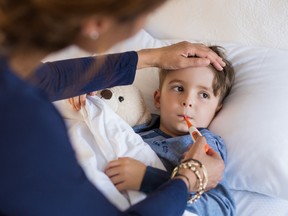Test less and get more rest this cold and flu season.
Postmedia may earn affiliate commissions from purchases made through links on this page.
Article content
Cold and flu season already sees a spike in viral infections among children in doctor’s offices and emergency rooms. Health care providers are reminding parents to prepare for the upcoming season, when COVID-19, influenza, respiratory syncytial virus (RSV), and other common viruses are all circulating at the same time. We are calling on you to be prepared.
In young children, these viruses can cause bronchiolitis (a lung infection similar to bronchitis in adults), which can require many medical visits, tests, and treatments. , much of which is unnecessary.
Advertisement 2
Article content
Article content
Bronchiolitis affects more than a third of children during the first two years of life, but most cases are mild and resolve on their own. The infection can cause inflammation of the small airways in the lungs, sometimes causing wheezing and making breathing more difficult. Children also experience a cough, nasal congestion, loss of appetite, and sometimes a fever.
Bronchiolitis is a diagnosis made by your health care provider based on your medical history and physical exam rather than diagnostic tests. However, despite recommendations to avoid additional testing, many children still undergo unnecessary testing and treatment for bronchiolitis.
In fact, research shows that more than half of children receive at least one type of treatment that is unnecessary and may even be harmful.
One common example is the unnecessary use of chest radiographs, which provide images of the lungs. Chest x-ray is not recommended for bronchiolitis. The findings can lead to an incorrect diagnosis of bacterial pneumonia, resulting in children receiving unnecessary antibiotics that do not help improve their symptoms.
Article content
Advertisement 3
Article content
Unnecessary antibiotics can cause allergic reactions, nausea, diarrhea, and abdominal pain in your child. At a global level, the rise in antimicrobial resistance continues to be a concern, and reducing unnecessary antibiotic use is critical to combating this growing threat.
So what should you do if your child is diagnosed with bronchiolitis?
It’s natural to feel stressed and anxious when your child becomes ill. If your child has symptoms, your health care provider will diagnose bronchiolitis. If your symptoms are mild, they can tell you how to relieve them at home and tell you what warning signs to look out for if your symptoms get worse or don’t get better.
Over-the-counter cough syrups and cold medicines are ineffective and unsafe for children under 5 years of age.
Health care providers recommend resting, staying hydrated, treating your child’s fever, and keeping your child up to date on immunizations. They may also give you information on how to manage your child’s symptoms and help them feel better through so-called “viral prescriptions,” while also explaining why antibiotics aren’t necessary.
Advertisement 4
Article content
Unfortunately, there is no quick-fix treatment for bronchiolitis, and the “wait and see” period can be stressful. The fever will subside within a few days, but the cough and stuffy nose may last for several weeks. However, unnecessary tests and prescriptions are useless and can do more harm than good.
To help you get through bronchiolitis this cold and flu season, Choosing Wisely Canada is collaborating with multiple health professionals to develop simple tips to support health care providers and educate the public about bronchiolitis. We have developed tools and resources. These resources provide answers to common questions and help parents make informed decisions about their child’s care.
Our main goal as health care providers is to ensure that your child gets better as quickly as possible. Remember to talk to your health care provider about your concerns and what you can do to help your child feel better this winter season.
Dr. Olivia Ostrow He is a pediatric emergency physician at the Hospital for Sick Children and associate director of the Center for Quality Improvement and Patient Safety (CQuIPS) at the University of Toronto.
Dr. Jennifer Young He is an Ontario-based family physician and a physician advisor to the Canadian Association of Family Physicians.
Sign up for our great parenting and advice newsletter at montrealgazette.com/newsletters.
Advertisement 5
Article content
Article content


comment
Postmedia is committed to maintaining a lively but civil forum for discussion and encourage all readers to share their views on our articles. Comments may take up to an hour for moderation before appearing on the site. We ask you to keep your comments relevant and respectful. Enabled email notifications. We will now send you an email if you receive a reply to your comment, there is an update to a comment thread you follow or if a user you follow comments. Visit our Community Guidelines for more information and details on how to adjust your email settings.